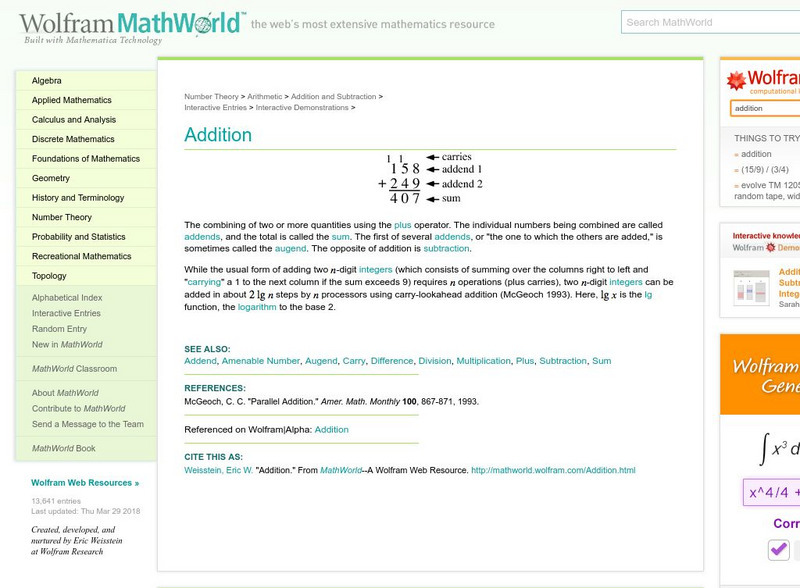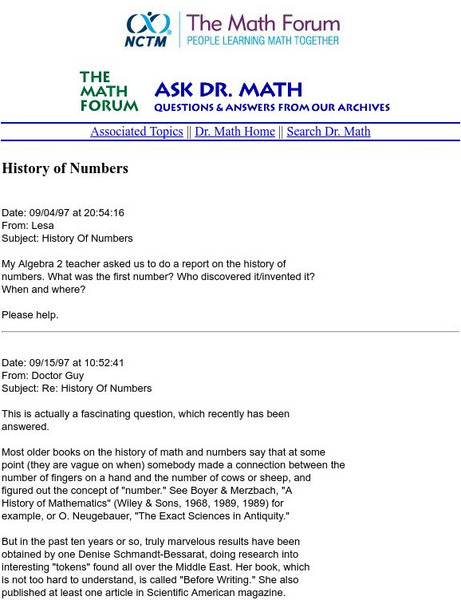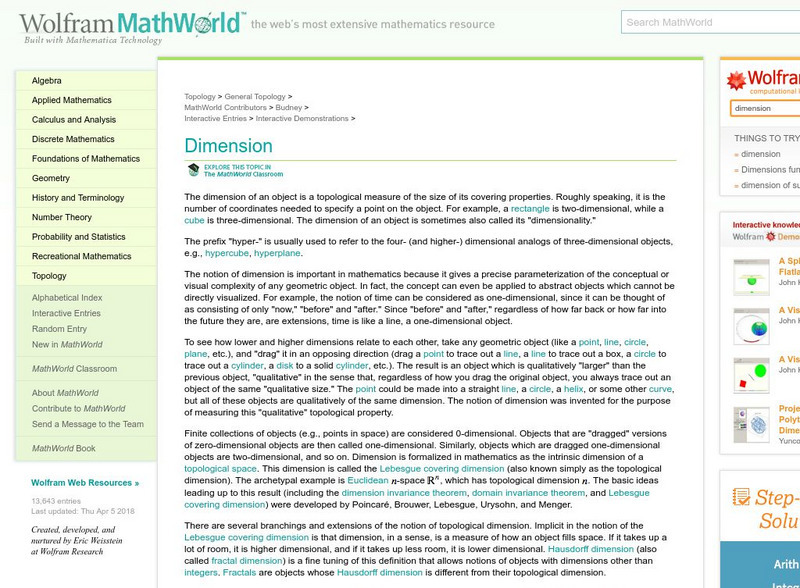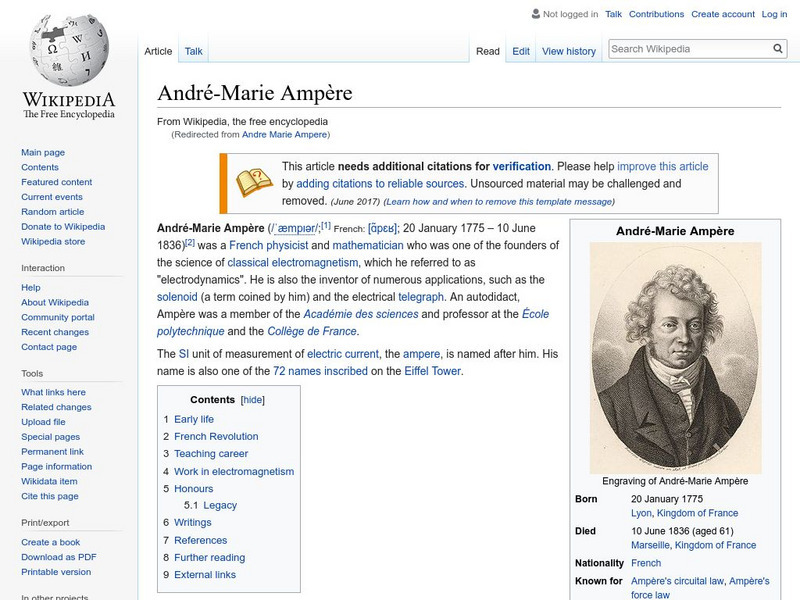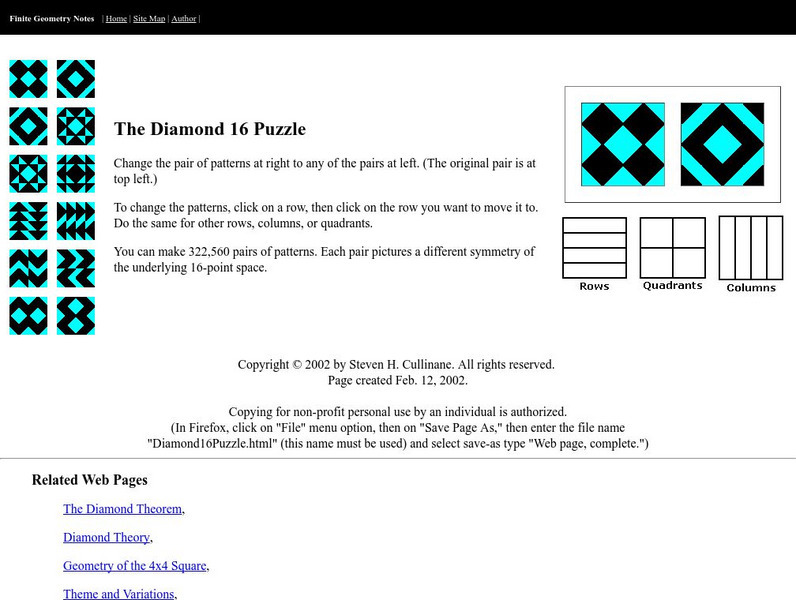Wolfram Research
Wolfram Math World: Euclid's Algorithm
This site from Mathworld.com provides a very detailed description of Euclid's algorithm of common divisors and a method of finding the greatest.
Shodor Education Foundation
Shodor Interactivate: Lesson: Fractals
This site provides some links to activities and lesson plans dealing with fractals and chaos.
National Council of Teachers of Mathematics
The Math Forum: Ask Dr. Math: Definitions of Rational, Irrational
Math Forum definition and explanation of rational and irrational numbers, the definitions of mathematics is also addressed.
Scholastic
Scholastic: Math Maven's Mysteries
Scholastic.com offers information on how to use the Math Maven's Mysteries to enhance problem-solving skills, partly through class discussion. For the actual mysteries, click on Math Maven Home.
National Council of Teachers of Mathematics
The Math Forum: Ask Dr. Math: History of Numbers
Dr. Math tackles the question of man's first use of numbers by relating the work of Denise Schmandt-Bessarat and her studies of "'tokens' found all over the Middle East.
Wolfram Research
Wolfram Math World: Congruent
This MathWorld site defines both meanings of the term congruent, also gives the commonly used notation.
Wolfram Research
Wolfram Math World: Dimension
This site from Mathworld.com provides information on what the dimension of an object means.
Wikimedia
Wikipedia: Andre Marie Ampere
This site from the encyclopedia Wikipedia provides a nice overview of the life of Andre Marie Ampere. Content covered includes an overview of his upbringing, his time as professor, and his study of electromagnetism.
Math Medics
S.o.s. Math: Application of Determinant to Systems: Cramer's Rule
This lesson explains how the determinant is used for Cramer's Rule.
The Math League
The Math League: Percent and Probability: What Is a Percent?
This site defines a percent, explains it as a fraction and decimal, and shows how to estimate a percentage.
Trinity College Dublin
Trinity College: Abraham De Moivre (1667 1754)
The events of the life of Abraham de Moivre are presented in a very abbreviated timeline form. The biographical information is taken from "A Short Account of the History of Mathematics" by W. W. Rouse Ball (4th Edition, 1908).
Trinity College Dublin
University of Dublin: Joseph Louis Lagrange (1736 1813)
Information on the mathematical achievements of Joseph Louis Lagrange as well as biographical information.
Trinity College Dublin
Trinity College: James Bernoulli (1654 1705)
The events of the life of James Bernoulli are presented in an abbreviated timeline form. The biographical information is taken from "A Short Account of the History of Mathematics" by W. W. Rouse Ball (4th Edition, 1908).
Other
Mathematical the Four Color Theorem and Computer Proof
This site describes the role of computer involvement in the four color map theorem.
Other
Research Pages: Circle Inversion Fractals
This site introduces the iteration of circle inversions and describes the associated properties.
Other
Polyhedra: The Five Platonic Solids
A brief site that includes some activities to understand the figures.
Other
Eal: Fract Ed
A great resource for beginners. The site begins with a definition of iteration of functions, and proceeds from there to discuss fractal dimension.
Other
Finite Geometry Notes: Diamond 16 Symmetry Puzzle
At this site see if you can solve the "Diamond 16" puzzle. Change the patterns to create ordinary or color exchange symmetry. This is just one of several challenging puzzles at this site. Links to similar puzzles and games.
Other
The Maya Calendar: A Converter
Gives the Mayan days and months. In addition, a Java Applet is included which will convert any date (Gregorian calendar) to its corresponding Mayan date.
Other
Technical Tutoring: Basic Math Operations
This tutorial resource provides help with math in addition, multiplication, subtraction, division, identities, powers, and exponentiation.
Other
Mayan Math
A basic, illustrated description of the math system developed by the Mayans. Includes a paragraph comparing the Mayan system favorably with the Roman numeral system of the same time.
Other
Ancient Greek Number Codes
Credited to the Cornell University Greek Epigraphy Project, the content on this page explains (and illustrates through a chart) the Greek use of Alpha characters for numbers.




